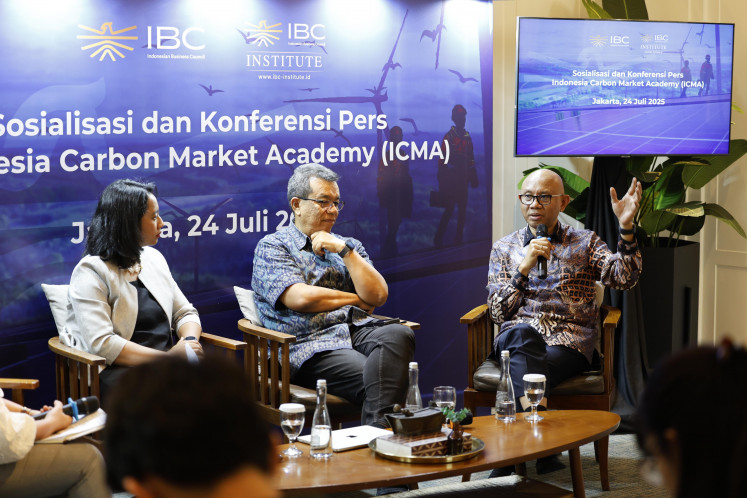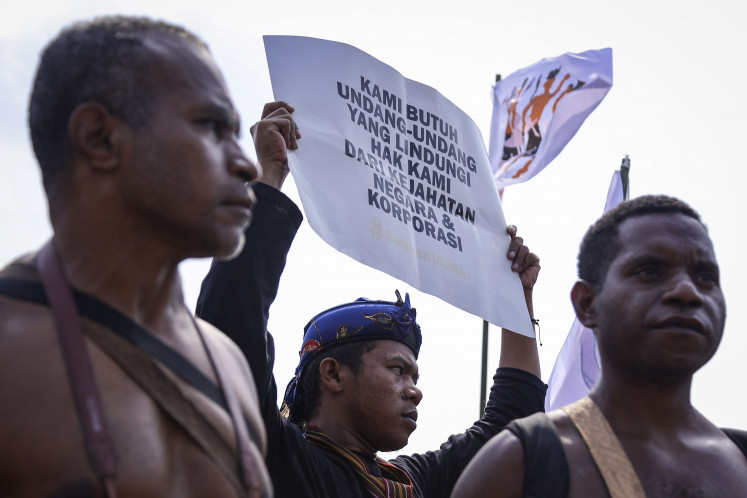Popular Reads
Top Results
Can't find what you're looking for?
View all search resultsPopular Reads
Top Results
Can't find what you're looking for?
View all search resultsCOMMENTARY: Questioning our pride as a democratic, tolerant and peaceful nation
Change text size
Gift Premium Articles
to Anyone
 Marching on: Muslims march along Jl. MH Thamrin during a rally in Jakarta on Friday. Around 100,000 Muslims took to the streets on Friday demanding the prosecution of Jakarta Governor Basuki “Ahok” Tjahaja Purnama for alleged blasphemy. They called on the police to immediately detain Ahok. (JP/Wendra Ajistyatama)
Marching on: Muslims march along Jl. MH Thamrin during a rally in Jakarta on Friday. Around 100,000 Muslims took to the streets on Friday demanding the prosecution of Jakarta Governor Basuki “Ahok” Tjahaja Purnama for alleged blasphemy. They called on the police to immediately detain Ahok. (JP/Wendra Ajistyatama)
W
e have long prided ourselves as the world’s third largest democracy after India and the US, and the country with the world’s largest Muslim population. The international community and global media outlets often describe Indonesia’s version of Islam as peaceful, tolerant and moderate.
We boast that violent, intolerant and radical Muslim groups are very small in number and influence. We believe that the country’s two major Muslim organizations, Nahdlatul Ulama (NU) and Muhammadiyah, are the legitimate standard-bearers of Islam in Indonesia.
We like to think that we are a pluralist society, a nation built on a foundation that disregards skin color, ethnicity and faith. We submit to the belief that we, as Indonesians, cling to the idea of “unity in diversity”.
On Friday, we woke up to the disturbing reality that we haven’t progressed very far from nativism and tribalism.
The Nov. 4 rally has exposed some of the ugliest parts of our politics, where skin color, ethnicity and faith become weapons to attack political rivals. With the presence of incumbent Jakarta Governor Basuki Tjahaja “Ahok” Purnama, a Christian and a Chinese-Indonesian, it is easy to see and hear the racist undertones in the political campaigns of his rivals. While the demonstration proceeded peacefully, at least until the evening, it was shocking to see some protesters shouting horrifying phrases such as “kill Ahok”, or displaying posters reading: “Wanted: Ahok, dead or alive”.
Where were the leaders of NU and Muhammadiyah on Friday?
Where were the leaders of the major political parties supporting Ahok’s reelection bid?
The mass protest was led by people widely known for their dislike, if not hatred, of President Joko “Jokowi” Widodo. Indeed, the hard-line Islam Defenders Front (FPI) led the rally, and lead the anti-Ahok movement.
FPI leader, Rizieq Shihab, an Indonesian of Arab descent, seems to have a personal grudge against Ahok, because the Jakarta governor is the only state official in the country who has the guts to demand that the central government dissolve the FPI.
In the lead-up to Friday’s rally, scores of Ahok’s political rivals put Jakarta’s gubernatorial election in the context of a “holy war”, or crusade against an infidel, with people such as former Muhammadiyah chairman Amien Rais urging Muslims not to vote for Ahok because he is a dajjal (a kind of anti-Christ).
Earlier this week, while flanked by a number of policemen, a protester, dressed in full Islamic garb, made a long speech and offered to give Rp 1 billion (US$76,900) to anyone who could kill Ahok if the incumbent governor visited certain areas in West Jakarta. Shortly after the speech, Ahok was forced to flee from a neighborhood in Rawa Belong in a public minivan after a group of protesters started to taunt him and demand that he leave the area where he was campaigning.
On Friday, protesters hung a massive banner reading “Hang Ahok Right Now” from a pedestrian bridge near Gambir Station. And the saddest part of this whole episode is that more than 100,000 people bowed to this violent rhetoric and showed up for the Nov. 4 rally.
The Jakarta election should be about the programs that the candidates are proposing to solve the myriad of problems plaguing the capital, from severe traffic congestion and pollution to garbage collection problems, reclamation controversies and housing for the poor. But since the campaign period began in mid-October, we have heard nothing but calls for Ahok to drop out from the race on allegations that he insulted the Quran. And nothing fires up the political base of Ahok’s rivals more than allegations that he insulted Islam.
The rivals of Ahok, who will certainly reap huge political gains if Ahok drops out of the race as a result of Friday’s rally, certainly share some of the blame for fanning primordial sentiments to get what they want.
All of us, however, should take responsibility for allowing such sectarian sentiments to grow and fester in our democracy.
We have been complacent for too long, happy to think that the movements against Ahok, and those groups responsible for acts of intolerance and violence in this country, are only fringe groups who matter little in politics.
On Friday, we were proved wrong. These groups now hold the keys to the Jakarta gubernatorial election and, probably, the success or failure of our experiment in democracy.
The sharp-tongued Ahok often provokes anger for his direct manner. However, it is hard to deny, even for his most hostile foes, that under his leadership, Jakarta has progressed and improved.
But the allegations that Ahok’s programs are beneficial to the middle and upper-income class of people, many of whom are Chinese-Indonesians and non-Muslims, and harmful to lower-income citizens, are also not totally baseless.
It is a brute reality that there are Muslims who do not want to have a non-Muslim leader. Many Muslims complain that they are a majority in this country, but a minority in terms of economic access.
It is also understandable that many non-Muslims fight as die-hard supporters for the reelection of Ahok because for a long time they have felt, rightly or wrongly, that they are second-class citizens in this country.
Some of them even believe that Jesus sent Ahok to save Jakarta, and later, if elected president, Indonesia. No one can touch Ahok because God will not allow anyone to harm him, their thinking goes.
The leaders of mainstream religious or political organizations are out of touch with the social and political reality. They belittle the role of small organizations such as the FPI.
Is this because they are too afraid to confront the intimidation and intolerance of the FPI and their ilk, or because Indonesia’s mainstream leaders actually agree with these small groups?









